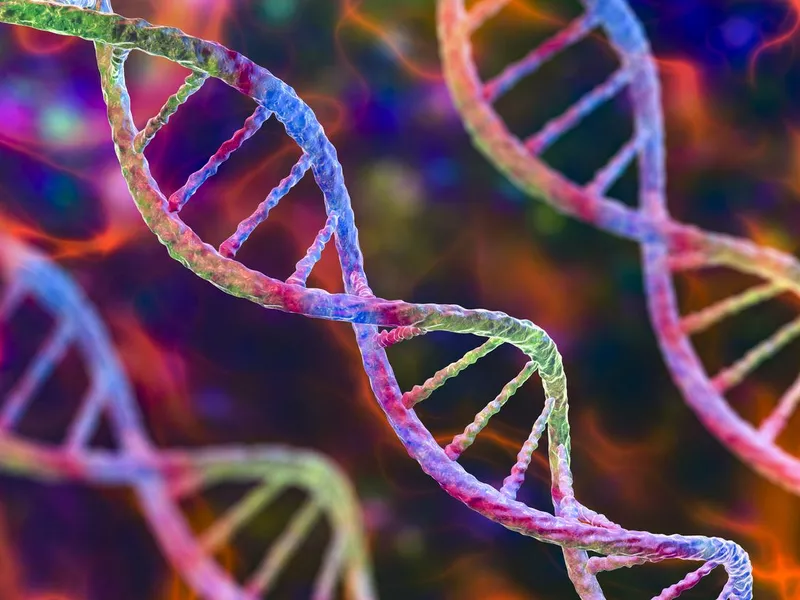How to Control Your DNA to Live Healthier and Longer
Genes are like a blueprint. According to epigenetic studies, however, we may be able to make edits whenever we want.
The genes you inherit are the luck of the draw. While it was once believed our genes were mostly set in stone, new studies show that we may be able to make edits to our DNA blueprint whenever we want. We can’t spontaneously decide to be 6-foot-5 or change our hair color at will, but we have more influence over our genes than previously realized.
The study of epigenetics has transformed the way we look at health and longevity. We spoke with Dr. Lucia Aronica, a lecturer at the Stanford Prevention and Research Center within the Stanford University School of Medicine, to sort out how biology can help us live healthier, fuller lives.
Dr. Lucia is an expert on how diet, genetics and epigenetics interact to impact our health and longevity. If you want to feel strong at any age, you can.
What Is Epigenetics Anyway?
Epigenetics is the study of how your environment and behaviors influence how your genes work. Remember the nature vs. nurture debate? It’s a more in-depth version of that.
With epigenetics, we explore how daily habits, like nutrition, fitness, sleep and even social environment can alter how our bodies and minds function. Not just in an external way, but on a cellular level.
Epigenetic changes don’t alter the DNA you’re born with, but they can alter how the DNA is read and expressed. It’s a little like cooking. You can’t change the ingredients you have on hand, but you can choose what to make with them.
How Genes Work: The Basics

Dr_Microbe / Getty Images
For a quick recap of ninth-grade biology class, genes are what make you, well, you. Our parents each contribute half of our genetic makeup, combining to form a blueprint that dictates everything from our height and bone structure to whether or not we hate cilantro. It’s more complex than that, but you get the idea.
That blueprint is called DNA. The DNA sequence we’re programmed with is set in stone, but that doesn’t mean you’re doomed to get cancer just because your grandma did. Think of an ordinary blueprint. It provides structure and guidelines, but what the house ends up looking like depends on the interpretation of the architect. In this case, your body is the house, and you’re the architect.
The decisions you make every day can alter how your genes are expressed, turning them “on” or “off.” These changes are called epigenetic changes. They can’t rewrite your DNA, but they can give you the power to fight back against hereditary health issues and aging.
Many Factors Influence Gene Expression

LPETTET / Getty Images
Can you control whether you’re at an elevated genetic risk of developing heart disease or diabetes? Not really. How you live, however, has a significant influence over whether those risks ever turn into reality.
Gene expression is influenced by diet, exercise and other factors in our environment, like exposure to pollutants, oxygen levels and even light and temperature changes.
Essentially, epigenetic research shows that within the old nature vs. nurture debate, the answer is rarely one or the other. Almost everything about our health is determined by a combination of both the genes we’re born with, and our experiences throughout life.
Multiple Types of Epigenetic Changes Are Possible

Aja Koska / Getty Images
To dig a little deeper, there are three types of epigenetic changes: DNA methylation, histone modification and non-coding RNA.
DNA methylation is the process of adding a chemical group to DNA. This blocks the proteins that “read” the gene, effectively turning the gene “off.” The other two types of epigenetic changes function differently, but the effect is the same. Their structure and actions serves to turn genes “on” or “off.”
Some of these changes are beyond our control. Infections, for example, can modify histones in certain immune cells, turning “off” genes that keep your immune system strong. Increased DNA methylation that lowers expression of the BRCA1 gene makes a person more likely to develop certain cancers, particularly breast cancer. Fortunately, other epigenetic changes are well within our control.
Epigenetic Influences Begin Before Birth

Amorn Suriyan / Getty Images
Epigenetic changes start very early. Your cells all have the same genes, but they all develop differently. Epigenetics help influence the function each cell performs, so that some become heart cells or nerve cells while others make up your muscles and skin. Same DNA, different expression.
What moms eat during pregnancy influences her baby’s epigenetics, and some of these changes can last for decades. For example, babies who were born during a famine were more likely to develop heart disease, type 2 diabetes and mental illness. And it’s all because of altered gene expression stemming from poor prenatal nutrition.
Not All Epigenetic Changes Are Good, but Many Are Reversible

coldsnowstorm / Getty Images
Since all aspects of our environment affect our body’s gene expression, or epigenome, both positive and negative changes are possible. Just like eating foods high in antioxidants can change our epigenome in a good way, taking drugs or drinking in excess can tip the genetic needle in the wrong direction.
Smoking, for example, can alter genes to make a person more likely to develop lung cancer. Those epigenetic changes aren’t permanent, however. After quitting, gene expression shifts back to normal, sometimes in under a year.
In other words, if you’ve led an unhealthy lifestyle for decades, it’s not too late to change your epigenome for the better.
Epigenetics Change With Age

Fly View Productions / Getty Images
Your epigenetics aren’t the same when you’re one as they are when you’re 100. DNA methylation levels decrease with age. They’re the highest when you’re born, gradually decreasing as you develop and age.
This explains why people are more likely to develop cancer and other diseases later in life. We can’t eliminate the effects of time, but we can shape our environments and habits to turn back the clock. At least to some extent.
If You Want to Change Your Genes, It’s Possible

bernardbodo / Getty Images
When everyone in your family has health issues or battles their weight, it’s easy to feel like you’re doomed. The truth is, you’re not. You totally have the power to influence your genes, and nutrition is one of the easiest ways to do that.
In the words of Dr. Lucia, “Different people can respond differently to the same food or diet depending on their unique characteristics such as genes, epigenetics, age, sex, and other lifestyle factors (e.g., activity level, stress, sleep, etc.). Rather than asking which diet is best for everyone, we can and should ask which diet works best for which people.”
FamilyMinded is partnering with Dr. Lucia Aronica for health and wellness news. To learn more about how you can take control of your health using science, check out Dr. Lucia’s free webinar, her website and YouTube channel.
More Dr. Lucia Stories on FamilyMinded